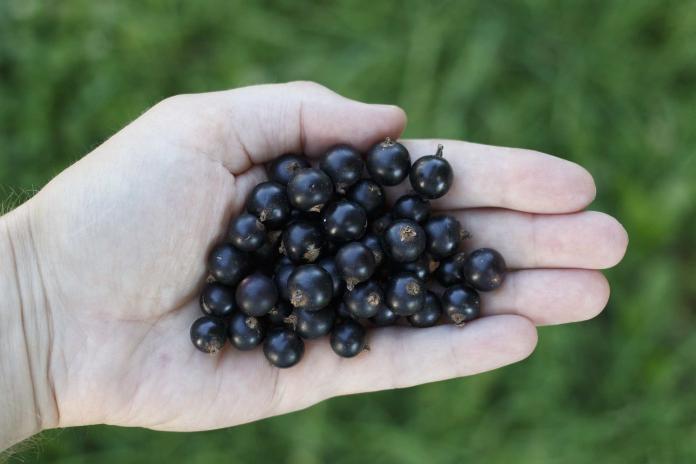The black currant (Ribes nigrum) is a woody shrub grown for its berries. Black currants are high in antioxidants, particularly vitamin C, which may have a variety of health benefits.
These antioxidants, like the anthocyanins in black currants, can help to enhance your immune system, allowing your body to fight infections and viruses more efficiently.
Black currants also contain high levels of gamma-linoleic acid, an omega-6 fatty acid.
In the United States, black currants have long been called the forbidden fruit.
Farmers claimed the tart berries, from Europe and Asia, spread a fungus that destroyed pine trees. It has a strong, tart flavor when young.
They become sweet when ripe.
Black currants are also high in several vitamins, minerals, and antioxidants, all of which have significant health benefits.
Black currants are rich in:
- Vitamin C, B-5, B-6, B-1 and E
- Gamma-linolenic acid (GLA)
- Antioxidants
- Anthocyanins
- Polyphenolic substances
The most notable antioxidant in black currants is vitamin C.
In fact, black currants’ vitamin C content is four times higher than that of oranges, and the antioxidants in black currants are twice as high as those in blueberries.
The body uses vitamin C to metabolize protein and form collagen, which is vital for skin care and anti-aging.
May Boost Immune System
Black currants have plenty of antioxidants.
These antioxidants may boost your immune system, soothe sore throats, and ease the symptoms of the flu.
Black currant leaves also have a variety of qualities, such as antimicrobial, anti-inflammatory properties.
One study in older adults showed black currant seed oil boosted their immune systems (1).
Gamma-linolenic acid (GLA) is a chemical found in black currant seed oil.
GLA may improve the immune system, making it more capable of fighting disease.
May Decrease Inflammation
Black currants are high in phytonutrients, antioxidants, vitamins, essential fatty acids, and minerals.
Blackcurrants are known for their high levels of vitamin C and GLA (gamma-linoleic acid), which is a very rare Omega-6 essential fatty acid.
Black currants contain anthocyanins, which are naturally occurring compounds in berries.
They are extremely potent antioxidants responsible for the color of blackcurrants.
Anthocyanins can reduce inflammation by inhibiting the enzymes cyclo-oxygenase 1 and 2 (2).
May Improve Skin Health
Although scientific research on black currant seed oil and its efficacy in treating skin conditions is lacking.
There are anecdotal claims that black currant seed oil helps ease the symptoms of psoriasis. You can directly apply it to dry, itchy, or stingy skin.
May Improve Heart Output
Black currant is high in potassium and GLA, which can help lower blood pressure. The GLA also helps the cells in your heart withstand damage and slows the clumping of platelets in your blood vessels.
One study in athletes found black currant powder increased heart blood flow and decreased peripheral resistance (3).
May Improve Eye Health
Black currants are high in anthocyanins. Anthocyanins are water-soluble vacuolar pigments that may aid in the treatment of eye disease.
The antioxidants in black currants improve blood flow to the eyes and may slow the progression of glaucoma (3).
Gamma-linoleic acid, linoleic acid found in vitamin C, and other antioxidants may also aid in the treatment of dry eyes and eye fatigue (4).
How to Eat Black Currant
Fresh black currants are less common than dried black currants, but they are available in some stores. When purchasing these berries fresh, look for deep purple skin.
Keep in mind that black currants can go bad quickly once picked. You can slow the process by putting them in the fridge or freezer.
While black currants have a strong flavor, when they’re ripe, they’re delicious to eat raw. You can also integrate them into a variety of recipes.
You can prepare black currants in a variety of ways, including:
- Cooking with sugar to make a jam.
- Baking them into muffins or fruit pies.
- Making fresh black currant juice.
- Making a refreshing black currant sorbet.
It is easy to integrate black currants into your diet. You can find blackcurrants as dried fruit, oils, pills, capsules, and powder.
In addition, you can mix the berries themselves into any recipe that calls for a little tangy sweetness.
Side Effects and precautions
Eating black currant berries in a moderate quantity is healthy. However, black currant supplements may cause side effects, such as soft stools, diarrhea, and intestinal gas.
In addition, black current supplements can interact with several medications and herbs.
Since it can delay blood clotting, people with bleeding problems or those about to have surgery should not use black currant supplements.
Talk to your doctor before using a black currant supplement.
Conclusion
Black currant berries may provide several health benefits. However, medical data to support its usage as a therapy is lacking.
If you are considering using it, make sure first that you speak to your doctor.
Before taking any supplements, including black currant seed oil or powder, ask your doctor for the proper dosage.

